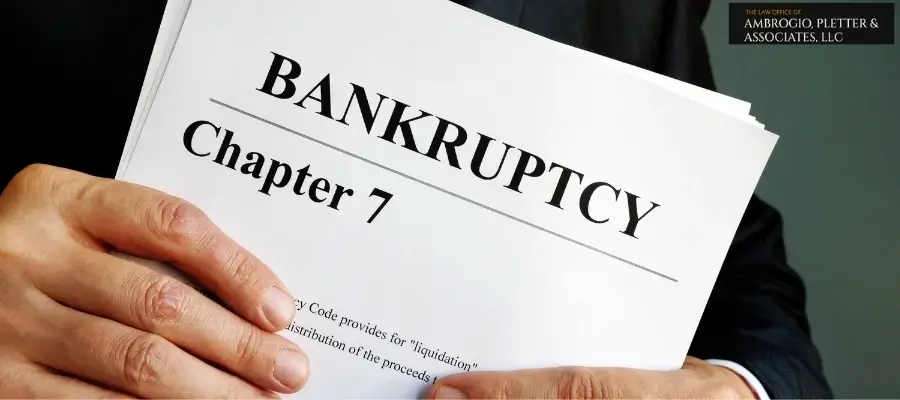|
Last Modified on Aug 17, 2025
Extreme financial obligations can be a stressful and disorienting experience. Having some knowledge on how to prepare for your first meeting with a bankruptcy attorney in Connecticut is a step towards taking back your financial life.
By talking to Tim Pletter of Ambrogio, Pletter & Associates, LLC, you will find out what you can do to get out of the clutches of your creditors so that you no longer feel in debt. Attorney Tim Pletter is a bankruptcy lawyer serving West Haven, CT, with more than 30 years of experience helping people get out of debt.
He will make sure you understand the Chapter 7 process by analyzing the means test to prepare everything you need and guide you through the 341 Meeting, now done remotely through Zoom.
Practical Steps West Haven Residents Should Take Before Meeting a Bankruptcy Attorney
It is important to prepare for your first meeting with Attorney Tim Pletter so that you will have a productive discussion concerning your financial situation. Here’s how you can get ready:
- Gather Financial Documents: Obtain the latest pay stubs, tax returns, bank account statements, as well as a list of all credit card bills, medical bills, loans, etc. This will give you a clear picture of your debts and assist in deciding the most appropriate bankruptcy petition to file based on the situation.
- List of Assets: Prepare a comprehensive list of your assets, including real estate, vehicles, and personal property. This data will guide in assessing what will likely be exempt when going through bankruptcy and what will likely be subjected to liquidation.
- Understand Your Debts: See how much money you owe to secured lenders (e.g., mortgages, car loans) and unsecured lenders (e.g., credit cards, medical bills). This is a very important distinction as it will influence the process of bankruptcy and possible outcomes.
- Know Your Income and Expenses: Have documentation of your monthly income and expenses. This will help determine whether you qualify under Chapter 7 or Chapter 13 bankruptcy. In 2024, there were 197,244 filings under Chapter 13 and 310,631 filings under Chapter 7.
- Prepare Questions: Write down the questions or concerns you may have about the bankruptcy process. This makes sure that you leave the meeting with a clear view of what your options are and what to do next.
The Means Test and Its Implications
To be eligible to file Chapter 7 bankruptcy, you must pass the means test. This is a comparison of your income with the state median income based on your household size. You may qualify for Chapter 7 more easily if your income is lower than the median.
Nevertheless, you may still qualify even with a higher income than the median, provided your allowable expenses leave you with very little disposable income. Connecticut periodically updates median income figures used to determine Chapter 7 bankruptcy eligibility. Currently, the median income for a single-person household in Connecticut is $82,341.
The Bankruptcy Process and Its Impact
As soon as you declare that you are filing Chapter 7 or Chapter 13 bankruptcy, an automatic stay is established, which puts most of the collection efforts on hold, including foreclosure attempts under Chapter 13. This gives you some breathing space with creditors as your case is dealt with. A Chapter 7 case in Connecticut takes around 188 days to complete on average.
Understanding Law Day and Its Significance
When a foreclosure claim is filed in Connecticut, a deadline, termed Law Day, is set. In the event that the debt is not paid by Law Day, the title to the property is reverted to the lender. A Chapter 7 bankruptcy filing will postpone the foreclosure process until after Law Day, which allows more time to find alternatives.
Homestead Exemption and Property Protection
Connecticut has a homestead exemption that allows the homeowner to shield a specified value of equity in their primary residence in case of bankruptcy. The exemption covers up to $250,000 in homeowner equity.
FAQs
Preparing to meet with your lawyer for the first time entails getting all your financial details and documents ready. You need to gather new pay stubs, tax returns, bank accounts, and an in-depth list of debts.
Make a list of your assets, including your home, vehicles, and personal property, and your monthly income and expenditure. Note down any questions or issues surrounding bankruptcy. By doing so, Attorney Tim Pletter will be able to examine your case in detail and guide you accordingly.
Common examples of what not to do prior to filing Chapter 7 bankruptcy include incurring new debt, making big purchases, or transferring assets to a third party. Do not attempt to close bank accounts or conceal property, without first discussing it with your attorney, as this may cause suspicion on the part of the bankruptcy trustee. You should also avoid paying large amounts back to family and friends that lent you money.
A bankruptcy filing appointment involves a step-by-step overview of your financial position with the lawyer. You will submit any pertinent documents, such as pay stubs, tax returns, bank statements, debts, and a list of assets.
Attorney Tim Pletter will examine your Chapter 7 or Chapter 13 eligibility, provide an overview of the means test, and address property-protecting exemptions. He will complete the necessary bankruptcy forms, answer your questions, and describe the remaining steps, such as the 341 Meeting of Creditors.
Hire a Chapter 7 Bankruptcy Lawyer
It can be overwhelming to face foreclosure or credit card debt alone in West Haven. The need to collect financial records, audit your debts, and beat deadlines may become impossible when you have no way to resolve your financial situation.
Tim Pletter and the legal team at Ambrogio, Pletter & Associates, LLC, are ready to look into your case and assist in identifying possible solutions to your financial problems. We will take you through the process of bankruptcy.



